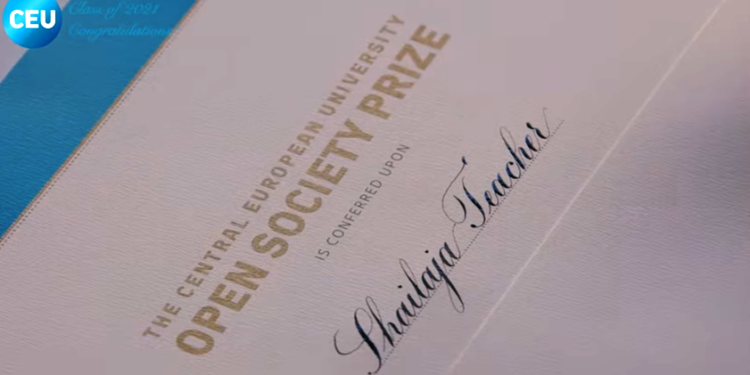Belgium, (Brussels Morning Newspaper) Afghan women and girls who are courageously fighting against gender discrimination and championing women’s education are having a transformative impact on their communities and society. Six outstanding women engaged in this struggle – Summia Tora, Pashtana Durrani, Munisa Mubariz, Tamana Zaryab Paryani, Aydin Sahba Yaqouby and Zeba Mirzayee – are the recipients of this year’s 2023 CEU Open Society Prize. They will be awarded the prize on June 23 at Central European University’s (CEU) 32nd Commencement Ceremony in Vienna, Austria.
“In a world plagued by patriarchy and violence against women, the indomitable spirit of so many Afghan women and girls has broken through the confines of silence and fear to voice the concerns and aspirations of women worldwide,” said CEU President and Rector Shalini Randeria. “As representatives of a new generation of Afghan women activists, the tireless work and dedication of the recipients of our Open Society Prize in promoting the rights and well-being of women and girls in their country has inspired many. Their unwavering commitment to fighting gender injustice calls for our urgent support. It is a shining example of what can be achieved with passion and determination to further the cause of women’s education.”
With their vision, courage and leadership, the awardees represent the ongoing struggle for the protection of rights for women and girls in Afghanistan. Pashtana Durrani, an Afghan feminist, activist, and educator, is the founder of LEARN Afghanistan, a grassroots organization that has created the country’s first-ever digital school network, offering education for 7,000 girls and boys in Kandahar who were unable to safely and securely access schools. Munisa Mubariz is a women’s rights and civil society activist who, before the Taliban took power in Afghanistan, worked as a monitoring and evaluation director in the country’s Ministry of Finance. In the face of Taliban oppression, Munisa, along with other activists, established a powerful women’s movement, which conducted several demonstrations in Kabul and the provinces, and campaigned through media interviews, social media and indoor protests across the country to make their voices heard. Tamana Zaryab Paryani is a political activist and journalist widely recognized as a symbol of the women’s struggle in Afghanistan and known for the fearless demonstrations she has led protesting against the Taliban rule. Imprisoned along with her four sisters for nearly one month, Tamana now lives in Germany where she continues to advocate for human rights, particularly the rights of women, and to shed light on the atrocities committed by the Taliban. Summia Tora is the founder of the Dosti Network, an organization dedicated to empowering persecuted Afghans by providing them with crucial resources for resettlement worldwide; and offering support for those remaining in Afghanistan. Through partnerships with organizations such as the World Bank, Malala Fund, United Nations, and Schmidt Futures, she champions education on a global scale, with a specific focus on refugees, women, and girls, in emergency contexts. Aydin Sahba Yaqouby is a young education advocate from Afghanistan who, since the Taliban takeover, has been advocating for the rights of Afghan girls to education. She has worked closely with The Malala Fund and UNESCO; and has spoken at multiple high-level panels urging the international community and policymakers to prioritize this issue. Aydin also organizes online classes for girls in Afghanistan. Zeba Mirzayee is a trained English language teacher and director of the Learning Center in Kabul, which offers a range of subjects for students who have no financial means to pay for their education, including free literacy classes for women, girls and boys.
The CEU Open Society Prize is the university’s highest honor, given annually to an individual or group in recognition of their exceptional commitment to the ideals of an open society. It was first presented to Sir Karl Popper in 1994, and subsequent winners have included 2015 Nobel Laurate for Literature Svetlana Alexievich; medical humanitarian
organization Medecins Sans Frontiers; the seventh Secretary General of the United Nations Kofi Annan; President of the Czech Republic Vaclav Havel; and former Minister for Health for Kerala, India, K.K. Shailaja Teacher. Last year’s recipient was the Ukraine 5 AM Coalition.
CEU is committed to the values of democracy, peace and justice, and stands in solidarity with the women and girls of Afghanistan. The current student body of the university includes 12 students from Afghanistan (six women and six men). CEU is both an acclaimed center for the study of economic, historical, social and political challenges, and a source of support for building open and democratic societies that respect human rights and human dignity. ln the three decades since its founding, CEU has graduated more than 18,000 students, who are currently located in nearly 150 countries. They include 56 graduates from Afghanistan (16 women and 40 men).
At CEU, the Open Society University Network’s (OSUN) Threatened Scholars Integration Initiative (TSI) has over the years contributed to 12 full scholarships for Afghan students and supports two Afghan women CEU graduates currently at the university as research and teaching assistants. In the aftermath of the Taliban’s takeover in 2021, through the collective efforts of the OSUN partners and the Open Society Foundations, around 200 students were evacuated from Afghanistan. Currently, over 450 Afghans are enrolled in undergraduate and master’s programs on OSUN campuses from Bishkek to Berlin, Vienna, and New York.




